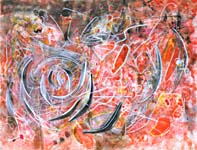Jonathan Meiburg, the lead singer and songwriter for the band Shearwater, is a trained ornithologist, which, when you see him live, seems exactly fitting for his long-gazing glazed eyes and arched neck—he certainly could have spent long hours peering at fragile birds and their soft wings, thin legs, black eyes. After he has performed and is standing behind you in the audience, Meiburg wears thin glasses and could be mistaken for any other beer-clutching overly-educated attendee at the Six Organs of Admittance show, but onstage in a Minus Story t-shirt, exploding feedback on his guitar, Meiburg is the kind of mysterious that is almost normative. There is nothing particularly entrancing about him except for the fact that there might be.
Except then he opens his mouth, to sing or to speak. Meiburg told three stories last night in his opening set. One was about taking an old-fashioned train on a demonstration run back from Philadelphia to the dilapidated Camden station, him aged seven and coming down with an intense fever that made everything pulse and expand. When the train stopped in the New Jersey forest for a photo-op, Meiburg detailed the greenery around him, and the train backing slowly down the tracks, moment lasting forever. His second story was about a trip for hawk research in the Galapagos, mysterious and bizarre—a leader who stank of rum, birds so docile they could easily be roped, hiking across lava and jungle. His last story, about a vain fisherman and a dead, pregnant shark and her unborn babies, was particularly eerie especially in its documented truth.
Meiburg’s stories, and to a lesser extent his songs, remind me overwhelmingly of the book that I’m in the middle of reading right now, The Dead Fish Museum by Charles D’ambrosio. This is a book I’ve been waiting for for years, ever since I read the story ‘Screenwriter’ in the spring of 2002. Sated by his book of essays, Orphans, and his first short story collection The Point, I am still immensely enjoying this new collection. The stories have the same sense as the ones Meiburg told during his show—they are about people who are not good, who teeter on cliché but retain an intensely fragile and intriguing quality and reward the audience in the end. They are about youth and sickness and being lost forever in a mind. D’ambrosio writes about bones and sharks and divorces with an equally nuanced level of detail—one that is intentionally hazy but also beautiful and pointed. He is trying to tell us something: these are not empty stories, but they are also vague and muddled in very specific ways. When Meiburg wraps up his story about the Galapagos abruptly, by saying, “Well, I guess the point of this is, I started seeing ghosts everywhere,” and launches into the desperate melody of another eloquent Shearwater song, we catch our breath and we twitter. It is this reaction, this progression, that D’ambrosio feeds me. The dark part of living—not in a dramatic way, but in a rather quiet and expected one. The story shouldn’t make us see ghosts—not logically—but, oh, how it does.
Astounding! Beautiful! Intricate! And really lame.
Subscribe to:
Post Comments (Atom)

No comments:
Post a Comment